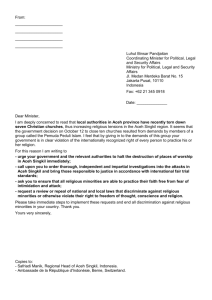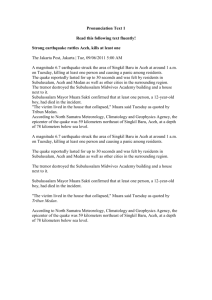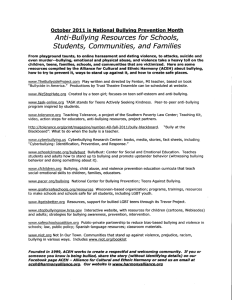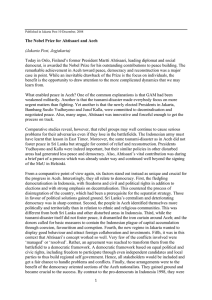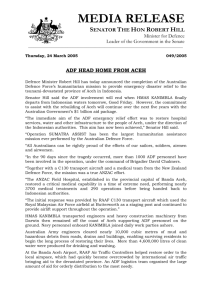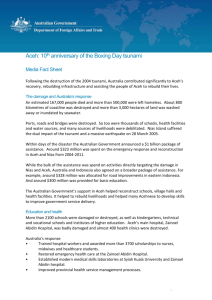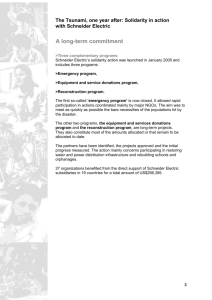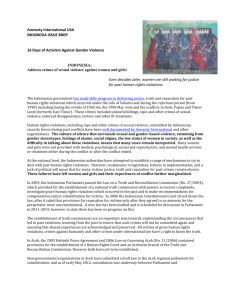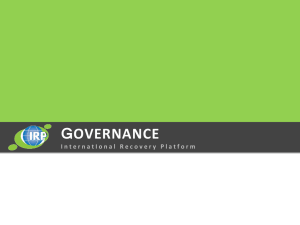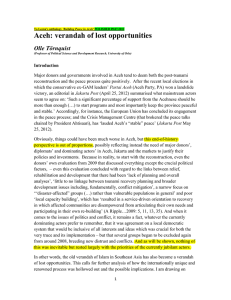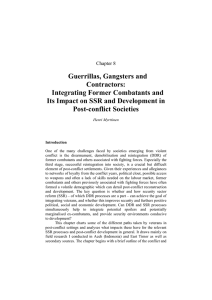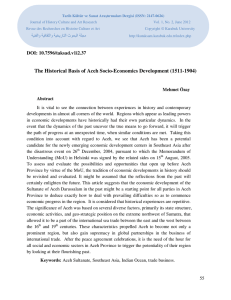Post script: Political vendetta or a democratic alternative?
advertisement
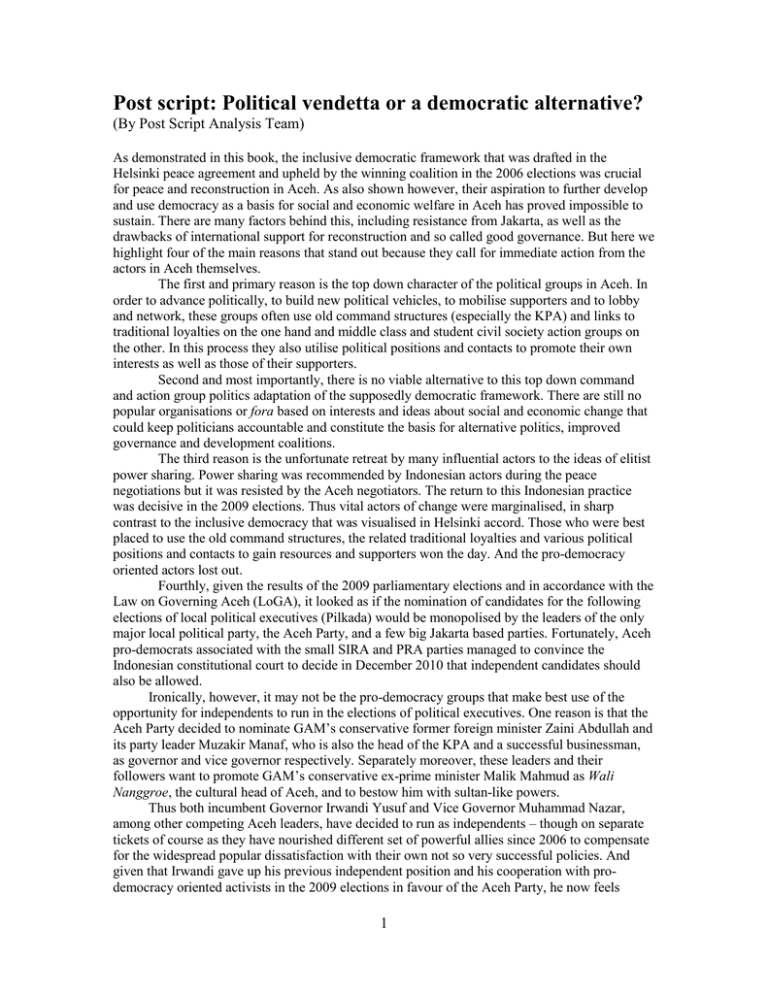
Post script: Political vendetta or a democratic alternative? (By Post Script Analysis Team) As demonstrated in this book, the inclusive democratic framework that was drafted in the Helsinki peace agreement and upheld by the winning coalition in the 2006 elections was crucial for peace and reconstruction in Aceh. As also shown however, their aspiration to further develop and use democracy as a basis for social and economic welfare in Aceh has proved impossible to sustain. There are many factors behind this, including resistance from Jakarta, as well as the drawbacks of international support for reconstruction and so called good governance. But here we highlight four of the main reasons that stand out because they call for immediate action from the actors in Aceh themselves. The first and primary reason is the top down character of the political groups in Aceh. In order to advance politically, to build new political vehicles, to mobilise supporters and to lobby and network, these groups often use old command structures (especially the KPA) and links to traditional loyalties on the one hand and middle class and student civil society action groups on the other. In this process they also utilise political positions and contacts to promote their own interests as well as those of their supporters. Second and most importantly, there is no viable alternative to this top down command and action group politics adaptation of the supposedly democratic framework. There are still no popular organisations or fora based on interests and ideas about social and economic change that could keep politicians accountable and constitute the basis for alternative politics, improved governance and development coalitions. The third reason is the unfortunate retreat by many influential actors to the ideas of elitist power sharing. Power sharing was recommended by Indonesian actors during the peace negotiations but it was resisted by the Aceh negotiators. The return to this Indonesian practice was decisive in the 2009 elections. Thus vital actors of change were marginalised, in sharp contrast to the inclusive democracy that was visualised in Helsinki accord. Those who were best placed to use the old command structures, the related traditional loyalties and various political positions and contacts to gain resources and supporters won the day. And the pro-democracy oriented actors lost out. Fourthly, given the results of the 2009 parliamentary elections and in accordance with the Law on Governing Aceh (LoGA), it looked as if the nomination of candidates for the following elections of local political executives (Pilkada) would be monopolised by the leaders of the only major local political party, the Aceh Party, and a few big Jakarta based parties. Fortunately, Aceh pro-democrats associated with the small SIRA and PRA parties managed to convince the Indonesian constitutional court to decide in December 2010 that independent candidates should also be allowed. Ironically, however, it may not be the pro-democracy groups that make best use of the opportunity for independents to run in the elections of political executives. One reason is that the Aceh Party decided to nominate GAM’s conservative former foreign minister Zaini Abdullah and its party leader Muzakir Manaf, who is also the head of the KPA and a successful businessman, as governor and vice governor respectively. Separately moreover, these leaders and their followers want to promote GAM’s conservative ex-prime minister Malik Mahmud as Wali Nanggroe, the cultural head of Aceh, and to bestow him with sultan-like powers. Thus both incumbent Governor Irwandi Yusuf and Vice Governor Muhammad Nazar, among other competing Aceh leaders, have decided to run as independents – though on separate tickets of course as they have nourished different set of powerful allies since 2006 to compensate for the widespread popular dissatisfaction with their own not so very successful policies. And given that Irwandi gave up his previous independent position and his cooperation with prodemocracy oriented activists in the 2009 elections in favour of the Aceh Party, he now feels 1 rejected by the old GAM autocrats who did not nominate him for a second period and thus wants to prove his case as ‘the real popular leader’, both to the old leaders that abandoned him and to the progressive actors that he set aside. This is partially reminiscent of the conflicts within GAM in 2005 that paved the way for the successful alliance between the KPA network with Irwandi as a major actor and the SIRA related activists with Nazar as their main figure in the 2006 local elections in opposition to the conservative leaders. At this particular point in time however the conflicts between the senior leaders are rather likely to reduce the space for progressive activists and democratic development. Irwandi, for instance is likely to use his access to resources in his attempt at regaining command of the KPA structure and consolidate his influence within the Aceh Party. And in contrast to the 2006 elections there is a need for much greater campaign funds, which calls for donations from business. Similar logic applies of course to Nazar and other major candidates too. The options for pro-democrats who remain short of both funding and organised popular and interests based support are thus quite narrow. Most probably, ordinary people and citizen organisations will not be able to influence much of the elitist political vendettas. One of the few opportunities that might emerge is if Governor Irwandi and a number of candidates in the district head elections conclude that they can not win without additional support from pro-democratic groups and their assistance in developing a progressive programme for the future of Aceh – to thus gain an international reputation and to foster an as broad as possible political movement of people from all walks of life behind an innovative agenda. This is only a possibility, but we know from elsewhere in Indonesia (such Solo in Central Java) as well as scattered constituencies in India for example, that mainstream political leaders can no longer rely on clientelism, bossism and huge financial resources only. To win elections they also need additional means of mobilisation. Thus many try to include populist measures and identity politics. Yet a few others who want to build a reputation for being more modern and democratic also try to link with progressive leaders and activists in order to gain extra votes. This may well end up in the cooption of activist groups, but there are also examples of well-prepared progressives who manage to develop transformative politics and make gradual advances. Given the current balance of forces in Aceh this is not impossible, though it is unlikely. Let us recall, however, that such an agenda and such a movement could be initiated and democratisation restarted by way of preferential treatment for the initiation and democratic inclusion of genuine interest-based organisations in public governance – with the long term aim of facilitating local and central level coalitions for sustainable and welfare-based economic development. This takes time but it is a way of engaging in politics without getting lost down the tempting shortcuts and instead facilitating consolidation and gradual advances. This has been done before in other contexts and under similarly difficult conditions; from Scandinavia in the past to parts of Brazil and India today – and in the emerging practices of innovative Aceh activists too. 2
